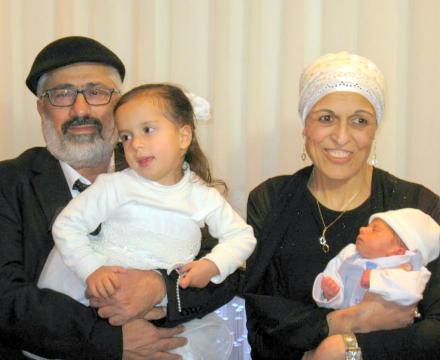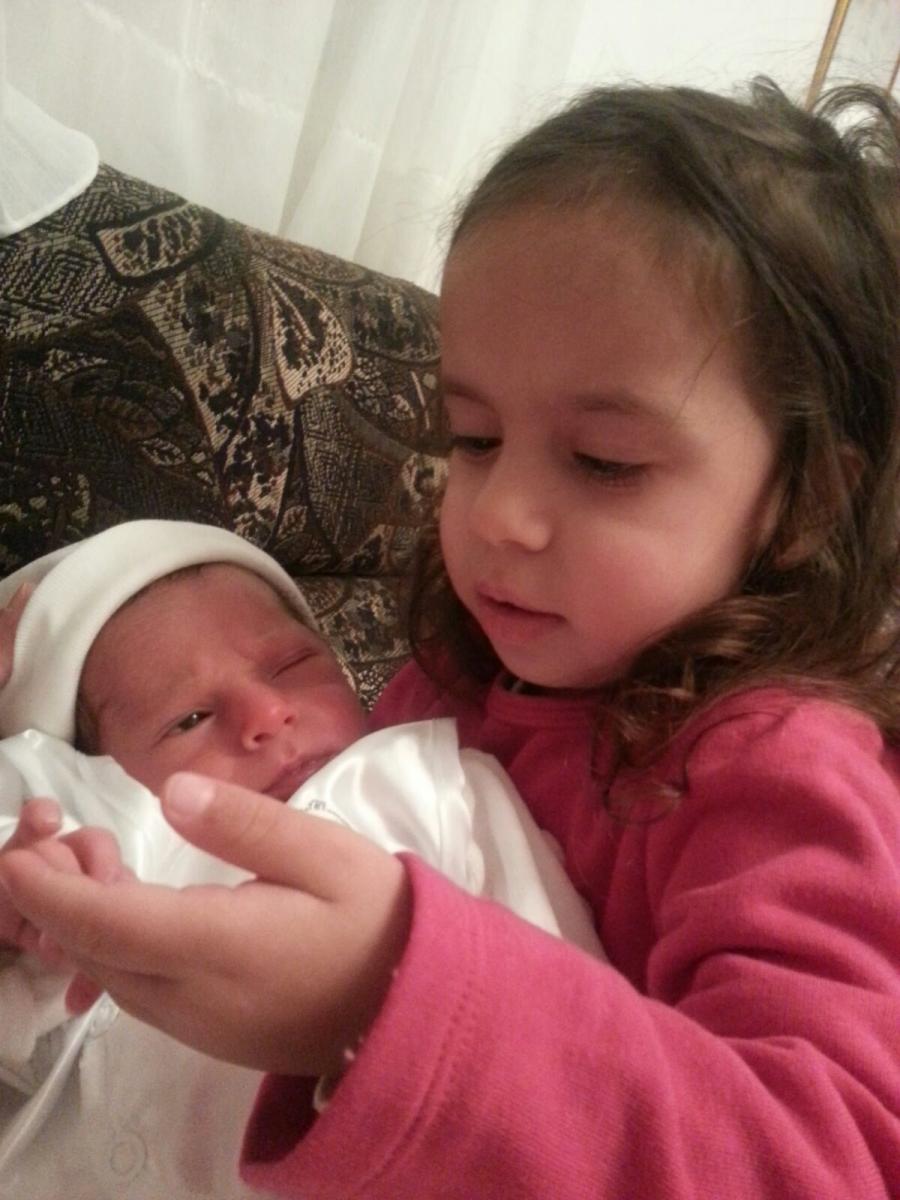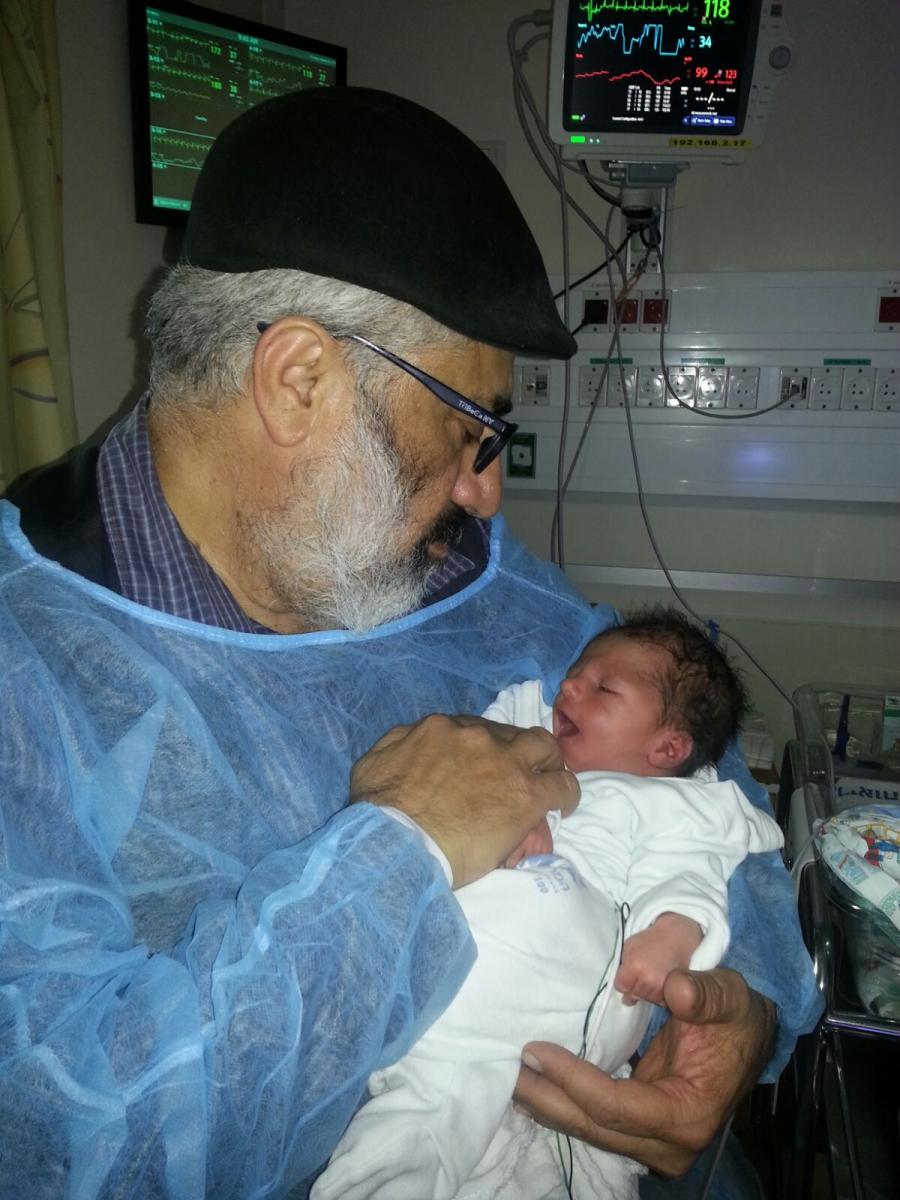The Miracle Continues: After 25 Years of Waiting, Their First Daughter Was Born, and Last Week, Another Son
Three years ago, Gabi and Ada Moty surprised everyone when, after 25 years of waiting, they welcomed their first daughter into the world. Recently, once again, their community was astonished to learn that Ada was pregnant. Yesterday, they celebrated the brit milah of their son. An emotional interview about the family's double miracle.

For 25 years, Gabi and Ada Moty from Kiryat Shmona waited for a child of their own. For 25 years, they poured out their hearts in prayer, with longing and tearful eyes, trying to maintain their faith that a great light would eventually pierce the darkness in their lives, illuminating them with a joy only parents know.
Initially, Gabi (59) and Ada (+50) did not suspect any specific problem was causing the delay. They knew other couples who had to wait a long time, and assumed it was the same case for them. However, after two years of unsuccessful fertility treatments, they realized there was an issue and, on the recommendation of a friend, sought professional guidance from Rabbi Menachem Burstein, founder of the PUAH Institute for fertility.
 The happy family complete
The happy family completeRabbi Burstein was moved by their story and took them under his wing. They were referred to a specialist doctor, and with great siyata dishmaya (heavenly assistance), at the end of a difficult journey spanning more than two decades, their prayers were answered, and Ada became pregnant.
Just two years after their first daughter, Rachel-Nangin, brought the long-awaited light into their lives, Gabi and Ada were blessed once again with another miracle – no less significant. Yesterday, on the 21st of Shevat, 31.1.16, they welcomed their son Aviad into the covenant of Abraham. And the feelings? Indescribable. "We are still in a kind of euphoria," Gabi, the happy father, shared in an interview with the Hidabroot website. He stood by his wife's side with great faith and love throughout the journey. "No matter how much I talk about it, it's still hard for me to comprehend this salvation. It's a gift from Heaven that is indescribable," he says.
Alongside the great joy, the painful undertone of this moving story cannot be ignored. "Ada is the true hero between us, and she deserves all the credit for her strong faith and the strength she mustered over 25 years and more. Despite all the difficulties and medical prognosis that gave her little chance of having a child, she insisted on believing that Hashem could do anything and would not remain indifferent to her prayers and wishes."
Gabi adds that Ada is like those who donate their bodies to science. "Ada gave her body to a challenging medical process that often exacted a heavy price. The first birth was not easy and genuinely risked her life. Even after that, Ada suffered unimaginable suffering."
Gabi recounts that a year and four months after Rachel was born, Ada experienced an intestinal blockage and was rushed to surgery at Kaplan Hospital during Shabbat Chol HaMoed. "She underwent a complicated procedure, from which, by the grace of Heaven, she emerged well. We were unaware that dietary fibers caused her blockage, and Ada continued to eat them as usual."
"Wisdom is Giving Thanks to Hashem During the Trial, Not Just After Salvation"
Shortly after the first surgery, the syndrome recurred, and Ada was hospitalized for a second surgery. On Friday afternoon, she came out of the operating room, and Gabi performed the Kiddush that Shabbat at 9 pm. "When the situation returned a third time, Hashem had mercy on us, and the intestines freed themselves. Then we understood that Ada needed to keep a distance from all fiber-rich foods that complicate digestion," Gabi says.
 Two treasures of the Moty family
Two treasures of the Moty familyThis time, the doctors took precautions, and during the birth, a surgeon specializing in intestines was involved. However, this time the anesthesia was full, and the baby was born asleep and placed directly into an incubator, from which he came out after five days.
Talking about his feelings during the pregnancy, Gabi reveals how he fulfilled the Rambam's commandment: "Love her as himself and honor her more than himself". "Unlike the first pregnancy, during this pregnancy, I had great concerns that, chas v'shalom (Heaven forbid), something would go wrong. I wasn't at ease." Despite the fears, thank G-d, everything went well. But if you ask Gabi about his attitude towards this from the start, and whether he believed the day would come when he would embrace his own son, the answer is at hand.
"To believe – we always believed, but Ada was the true fighter. I was torn in many ways. On one hand, I certainly wanted more children. I am a person who loves and connects with children very much. Since I was young and imagined what my home would look like, I saw many children in it. So, of course, I wanted more kids, but seeing Ada suffer for it wasn’t easy for me to send her back to 'battle'. Before we had Rachel, I found myself giving up. I thought, 'There are limits to what a person can bear,' because I couldn't stand seeing my wife suffer so much. After Rachel, it was easier to believe, but there were still difficulties. The danger to Ada's life was present every moment, and it was hard for me to witness that."
 Gavriel Moty with his son Aviad. Stood by his wife's side throughout
Gavriel Moty with his son Aviad. Stood by his wife's side throughoutWere there moments of despair along the way?
"For me, perhaps yes, but not for Ada. We both work in education, and we both have large families with many nieces and nephews. I remember telling her more than once, 'We have many students and nieces, let's be content with that. That's something,' but Ada didn't give up. Ada belongs to a special kind of women, those about whom it is said: 'Thanks to righteous women we were redeemed and in the future will be redeemed'. Based on the doctors' predictions, I adopted a realistic approach, whereas she put all that aside and only believed in Hashem. Thanks to her faith, today we are blessed to bring our son into the covenant of brit milah," says Gabi. Incidentally, the sandak (godfather) was none other than Rabbi Burstein himself ("He was a good envoy for us, and this is our way to thank him").
On an optimistic note, Gabi wishes to strengthen the Jewish people with simple faith, saying that there is only one purpose to all this exposure: to make the Jewish people thank Hashem publicly even during the trials – because it's not wise to be grateful only after the salvation. "In the portion of Yitro, there's a verse I relate to greatly: 'I used to know Him before, and now even more so'. Even before we received Rachel, I believed in Hashem, and undoubtedly the connection with Him grew after we received salvation, but there's a certain danger in this.
"Many people who heard our story and the way we were saved said, 'There is Hashem'. But then I understood an amazing lesson: Hashem exists in any case and in any way, and we need to recognize his existence, love, and thank him – regardless of what he does or does not give us. If he doesn’t give, he has his reasons, and he doesn't have to explain them to us. It is our duty to praise him even in dark times, even in moments when he finds it right not to fulfill our wishes.
"King David already wrote in Psalms 'Your rod and Your staff, they comfort me'. Meaning, the rod with which Hashem sometimes 'strikes' us, so to speak, we also lean on it. That's where our comfort comes from. Yes, sometimes Hashem gives a 'slap', but that too is out of mercy. His ways are purely merciful; we just don't always see it."
And as if to validate his words, he adds: "After Rachel was born, I was invited to one of the local schools – to talk about faith. I went to honor them but felt I wasn't the right person. Because what's wise about believing after seeing salvation with my own eyes? Faith should be nurtured even before you receive salvation, then and only then – that’s the true test."
Watch the "Another Direction" program where Gabi and Ada appeared after their first miracle, but before the second birth:

